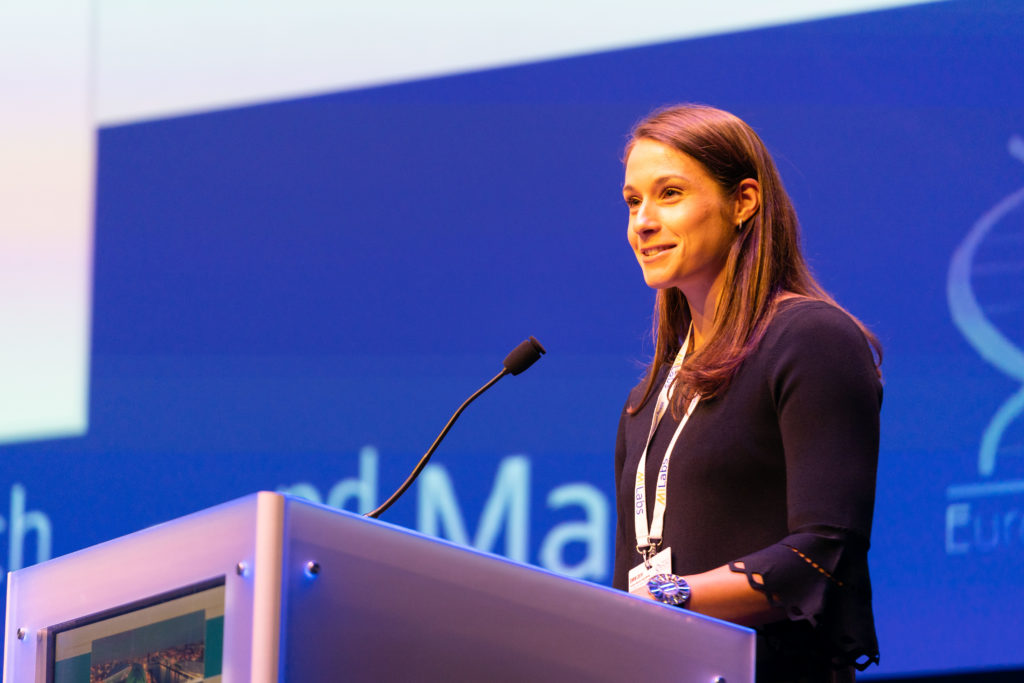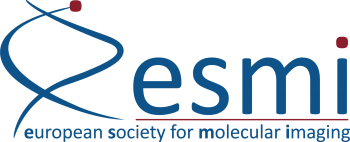Congratulations!
The Award 2018 goes to Aleksandra Pekošak from Amsterdam for her thesis on “Carbon-11 Labeled Amino Acids and Peptides: Chemistry and Applications”
Carbon-11 Labeled Amino Acids and Peptides: Chemistry and Applications
Abstract
The short-lived positron-emitting radionuclide carbon-11 possesses unique potential for labeling a variety of interesting molecules for positron emission tomography (PET) imaging without interfering the molecular lead structure. Construction of carbon-11 labeled amino acids and peptides in a rapid, multi-step, and stereocontrolled manner has been a key challenge up to now. In this thesis, we have proven that comprehensive step-by-step investigation results in so far unprecedented highly stereoselective catalysis of prochiral substrates allowing the preparation of a broad variety of carbon-11 labeled amino acids and, more importantly, short peptides with excellent regioselectivity and enantiomeric or diastereomeric excess. Taken together, the research described provides fundamental advances in carbon-11 chemistry and presents the tremendous potential of carbon-11 peptides, as well as peptidomimetics, in cancer and brain imaging.
References
- A.Pekošak§, U. Filp§, A.J. Poot, A.D. Windhorst. From Carbon-11 Labeled Amino Acids to Peptides in Positron Emission Tomography: The Synthesis and Clinical Application. Mol. Imaging Biol. 2018, 20: 510-532
- A. Pekošak, U. Filp, L. Rotteveel, A.J. Poot, A.D. Windhorst. Improved Synthesis and Application of [11C]Benzyl Iodide in Positron Emission Tomography Radiotracer Production. J. Label. Compd. Radiopharm. 2015, 58: 342-348
- A. Pekošak, U. Filp, J.Škrinjar, A.J. Poot, A.D. Windhorst. A Rapid and Highly Enantioselective C-11C Bond Formation of L-[11C]Phenylalanine via Chiral Phase-Transfer Catalysis. Org. Biomol. Chem. 2017,15: 570-575
- A. Pekošak, B.H. Rotstein, T.L. Collier, A.D. Windhorst, N. Vasdev, A.J. Poot. Stereoselective 11C-Labeling of a “Native” Tetrapeptide Using Asymmetric Phase-Transfer Catalyzed Alkylation Reactions. EurJOC 2017, 2017: 1019-1024
- U. Filp§, A. Pekošak§, A.J. Poot, A.D. Windhorst. (§: Shared authorship). Stereocontrolled 11C-Alkylation of N-terminal Glycine Schiff Bases to Obtain Dipeptides. EurJOC 2017, 2017: 5592-5596
- A. Pekošak, J.Ž. Bulc§, Š. Korat§, R.C. Schuit, E. Kooijman, R. Vos, M. Rongen, M. Verlaan, K. Takkenkamp, W. Beaino, A. J. Poot, A.D. Windhorst. Synthesis and Preclinical Evaluation of the First Carbon-11 Labeled PET Tracers Targeting Substance P1–7. Mol. Pharmaceutics. 2018, 15, 4872-4883
Impact of work
Over the last two decades, peptides have grown in prominence in pharmaceutical research and development due to their wide-range of applications in numerous diseases, such as cancer, neurology and metabolic disorders. Peptide-based drugs are nowadays used for treatment of breast, ovarian and pancreatic cancer, not mentioning the variety of peptides tested at preclinical stages for their efficacy in cancer treatment. Despite the plethora of opportunities to use peptides in therapy, numerous challenges are impending their widespread adoptions. Application of PET could facilitate the rapid and smooth translation of various peptide-based candidates for translational research and consequently minimize the costs. For this reason, isotopologue radiolabeling with carbon-11 resulting in unmodified, moreover enantiomerically pure radiopharmaceutical, would enhance the research and development of peptide therapeutics. Therefore, approaches for high stereoselective synthesis could serve as a particularly versatile tool to access chiral peptides, next to amino acids, without relying on resolution of racemates.
Furthermore, native carbon-11 peptide labeling would be ideal strategy to radiolabel cell penetrating peptides and peptides targeting the CNS, like BBB shuttles. Nonetheless, brain delivery remains one of the major challenges in drug development as BBB prevents most drugs reaching their targeting. For this reason, highly sensitive and efficient validation of BBB penetration in the preclinical stage is imperative.
Aleksandra’s comments on her future carreer plans
After the completion of my PhD thesis in November 2017, I continued research in then group of prof.dr. Windhorst as a post-doctoral researcher gaining additional experience in antibody
radiolabeling as well as in development of PET tracers to image neuro-inflammation.
Following my drive to go beyond research itself and increase an international exposure, I successfully applied and obtained a personal NWO Rubicon grant, which gives young, highly promising researchers in the Netherlands an opportunity to gain international experience. Thus, in June 2018 I joined the group of assoc. prof.dr. Schibli at ETH Zurich in Switzerland, as a NWO Rubicon supported post-doctoral fellow, further specializing myself in the development of novel strategies for cancer theranostic, diagnosis and radiotherapy, using radiolabeled peptides.
During my doctoral training, I recognized complexity of scientific research very appealing, which further sparked my long-standing interest for research and development of novel radiopharmaceuticals. Therefore, my primary goal is to establish my own independent research group in the area of radiopharmaceutical sciences. I will use my creativity to conduct high-level interdisciplinary science focused on the design of novel radiopharmaceuticals for in vivo PET imaging, and partially also therapeutic agents, in the field of oncology. I will achieve my ambition to become one of the next generation experts in cancer imaging in Europe by striving for the following:
- Gain experience to bridge fundamental advances in radiochemistry and real clinical (research) needs.
- Build close cooperation with radiochemist, radiopharmacists, biologists, medical physicists and radiologists.
- Create new collaborations between the different departments and universities world-wide.
With this ambition, I strongly believe that distinguished ESMI PhD award will contribute to the realization of my ambitious plans.

Winner 2018
“Aleksandra developed novel methods to radiolabel amino acids and small peptides in a natural position. Her PhD work combined organic chemistry, medicinal chemistry, analytical chemistry, radiochemistry with short-lived radionuclide carbon-11 and preclinical evaluation of radiotracers.
Bert Windhorst – supervisor
Aleksandra’s unique approach and novel methodology development unveiled previously unattainable unmodified carbon-11 labeled peptides for PET imaging studies.
Aleksandra successfully finished the experiments and handed her thesis to the reading committee in precisely 4 years, as a first PhD student in my group to accomplish the PhD training during her employment. Besides this outstanding accomplishment, she published 7 research papers as first or second author and 4 additional papers as co-author, in total 11, which is an unprecedented and exceptional achievement in radiochemistry research.”
